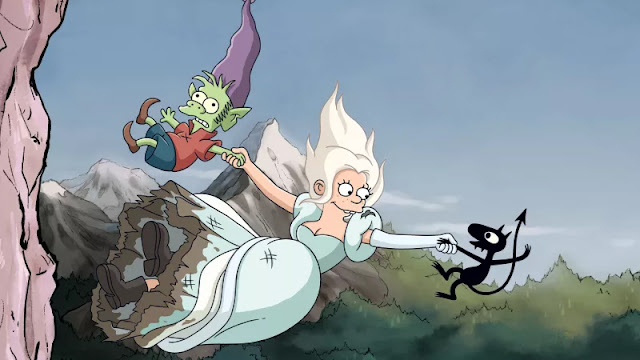Review: Disenchantment - Season 1
Today is the day! The first season of Disenchantment is now on Netflix, and I'm here to tell you all about it. The trailer for the show contained lots of clips from the ten-episode season, which can be good or bad. It gave a pretty accurate portrayal of the tone, but it also revealed a lot of the jokes in advance. For that reason among others, the last two episodes of the season were the best because they were the only ones that had just barely been hinted at earlier on, including a most likely unintentional Mysticons reference. The rest of the episodes had their ups and downs. There were a few fractured fairy tale references, but most of the stories were original. The pacing was pretty good overall. Any violence was there purely for the sake of comedy, and it never got gratuitous. That said, I think I still prefer Futurama overall thanks to its colorful cast of characters and clever story ideas. Still, it was refreshing to see a Matt Groening show with a female lead, even if she wasn't as complex as Leela.
Disenchantment is the story of Princess Tiabeanie, or Bean for short, who, like most princesses, wants to get out of an arranged marriage so she can find herself and find love on her own terms. In that respect, the pilot starts out similarly to ABC's 2015 Galavant with a royal wedding that the main character wants to stop. Even though I didn't love Galavant, one thing that it had going for it that Disenchantment didn't was the fantastic music by Alan Menkin. Bean is not the type of princess who sings, and the show's theme song lacks the catchiness of The Simpsons or Futurama openings. The gypsy style score was pretty bland compared to the beautiful fairy tale animation, but the twist at the end made up for that. I think Galavant did better in the humor department as well. Many of Disenchantment's jokes were either hit or miss. It followed the traditional Matt Groening style of humor, but there wasn't as much of it as you might find in some of his older shows.
According to Disenchantment, Bean is only 15 years old, but her alcoholic tendencies and lack of modesty make her more similar to a college-aged woman. She was everything a princess shouldn't be. It's too bad the media's rebellion against the damsel in distress stigma for princesses is becoming a bit of a cliche. What makes Bean truly stand out from other animated heroines, though, are her sidekicks. Instead of animal friends, Princess Bean joins forces with a lustful elf named Elfo and her personal demon that she received as a wedding present named Luci (like Lucifer). Luci is mostly there for comedic purposes, but he also serves as an allegory for Bean's struggle with morality. Even though she isn't pure and chaste like other fairy tale princesses, she genuinely desires to be a good person and doesn't know how to go about it. Luci is a literal representation of the voice in her head that tells her to do the wrong thing and gets her into trouble. Elfo relates to Bean's struggle to fit in because he is an elf who doesn't want to be a part of the happy communist elf society.
Just like other princesses, Bean would do anything for her friends. Once she solves her arranged marriage struggles, the first few episodes are devoted to her desire to protect both Luci and Elfo from people who want to hurt them. Her father, King Zog, believes that he can use Elfo's blood to create an elixir of immortality. Bean does her best to free him from her father's efforts because she knows what it feels like to be trapped. She spends another episode saving Luci from an exorcist. Even though she's on a first name basis with everyone at the local pub, Bean doesn't have any real friends before she meets Elfo and Luci, which makes her all the more determined to protect them. In some ways, Bean's personality reminds me of Ariel from The Little Mermaid series of the early '90s because she sees herself as an outcast who is only able to befriend other creatures who don't feel like they belong.
For a Netflix show, Disenchantment didn't have quite as much continuity as you might expect. The first two episodes and the last two episodes were directly linked, but everything in between was pretty disjointed. Some episodes were better than others. The show always played it safe and never brought up anything that might be considered objectionable. The maturity level of the content never went beyond anything an episode of Futurama might have shown, which was a relief after seeing the Game of Thrones comparisons in interviews. It was pretty entertaining, but not perfect by any means. If it were up to me, the last two episodes would have happened much earlier with the rest of the season revealing the events that take place afterward, but I suppose they needed to build up suspense for a likely second season, which we unfortunately probably won't be able to see for another year.












Comments
To me Bean looks like she's 15 going on 35! I NEVER would have guessed that she was a teen or anywhere close to being one.